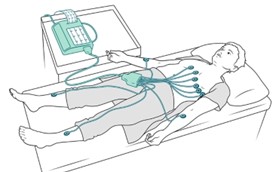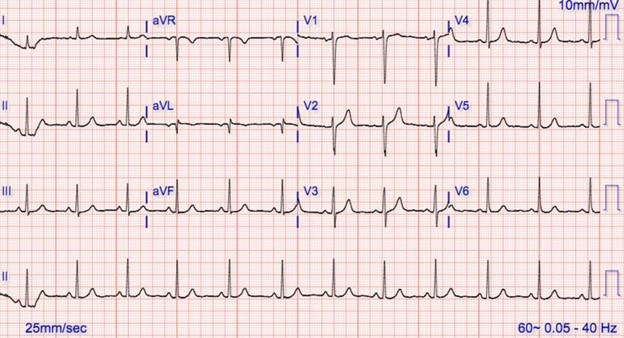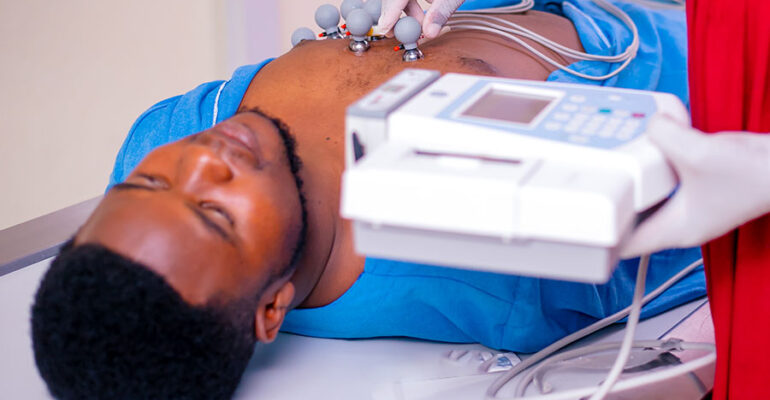ELECTROCARDIOGRAM (ECG)
ECG is a medical test that detects heart problems by measuring the electrical activity generated by the heart as it contracts.
A doctor may recommend an ECG for people who may be at risk of heart disease because there is a family history of heart disease, or because they smoke, are overweight, have diabetes, high cholesterol or high blood pressure.
Also an ECG is recommended for people who are displaying symptoms such as chest pain, breathlessness, dizziness, fainting or fast or irregular heartbeats.
ECG is a safe and non-invasive procedure with no known risks.
Before you have a medical test, make sure you ask your doctor why you need it. Ask him or her to explain all the potential benefits and risks. Together, you can make the best choice for you and your health.
ECG PROCEDURE
Electrodes (small, plastic patches that stick to the skin) are placed at certain spots on the chest, arms, and legs. The electrodes are connected to an ECG machine by lead wires. The electrical activity of the heart is then measured, interpreted, and printed out. No electricity is sent into the body.

Normal ECG sample result

TYPES OF ECG ARE;
- Resting ECG – you lie down for this type of ECG. No movement is allowed during the test, as electrical impulses generated by other muscles may interfere with those generated by your heart. This usually takes 5 to 15minutes.
- Ambulatory ECG– if you have an ambulatory or holter ECG you wear a portable recording device for at least 24 hours. You are free to move around normally while the monitor is attached. This type is used for people whose symptoms are intermittent[start-stop]and may not show up on a resting ECG, and for people recovering from heart attack to ensure that their heart is functioning properly. You record your symptoms in a diary, and note when they occur so that your own experience can be compared with the ECG.
- Exercise stress test– used to record your ECG while you ride on your exercise bike or walk on a treadmill. This type of ECG takes about 15-30 minutes to complete.
LONG TERM OUTLOOK - HEART PROBLEMS DIAGNOSED BY ECG
Some of the various heart problems that can be diagnosed by ECG include:
- enlargement of the heart
- congenital heart defects involving the conducting (electrical) system
- damage to the heart such as when one of the heart’s arteries is blocked (coronary occlusion)
- abnormal rhythm [arrhythmia]- rapid, slow or irregular heart beats
- poor blood supply to the heart
- abnormal position of the heart
- heart inflammation – pericarditis or myocarditis
- cardiac arrest during emergency room or intensive care monitoring
- disturbances of the heart’s conducting system
- imbalances in the blood chemicals (electrolytes) that control heart activity
- previous heart attacks.
Other tests done to detect heart problems
- Chest x-rays
- Echocardiogram[ ultrasound of the heart]
- physical examinations[listening to the heart sounds].
- MRI or CT scan of the chest
- Blood tests
Quick bits
To See If You’ve Had a Heart Attack.
When you arrive at the emergency room with symptoms of a heart attack, an ECG is often the first test you’ll undergo. Your doctor can tell from the electrical impulses of your heart whether you’ve had a heart attack or another heart problem. The results are even more helpful if your doctor can compare them to an ECG you had earlier.
To Check Up on Your Treatment
If you’ve already received a diagnosis of heart disease, your doctor may perform an EKG when you come in for a visit. The results tell him or her how well your medications, pacemaker, or other treatments are working. You might also get an ECG before major surgery, to make sure it is safe for you to have anesthesia.
When Starting a New Exercise Routine
Most healthy people can safely do moderate exercise without heart tests. But if you have diabetes or another chronic condition and have decided to start a new routine, your doctor may advise an EKG to rule out any hidden heart problems that might worsen during physical activity.
Key Takeaways
- Before an ECG, ask your doctor to explain why you need it, as well as the test’s potential benefits and risks, so you can make informed health decisions.
- If you experience heart disease symptoms, contact your doctor. He or she may run an ECG to diagnose the problem.
- If you have a chronic condition and want to start a new exercise routine, ask your doctor whether an ECG is necessary to rule out hidden heart problems.
- The ECG test has no side effects.


